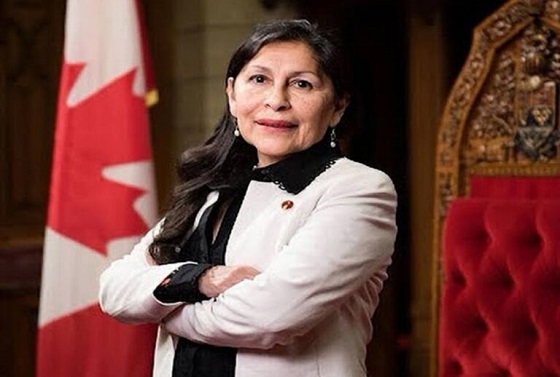Energy
Canada creates a brand new fossil fuel subsidy – Awkward: Etam

From the Frontier Centre for Public Policy
By Terry Etam
Upon hearing about the federal government’s decision to roll back the carbon tax on heating oil, I rolled up my sleeves. The point of writing about energy at all is to try to illuminate some aspect of an energy topic from a viewpoint inside the energy sector; to explain some energy nuance that the general population, which cares little for the nuances of energy, may find valuable. Energy is not simple, and there are a lot of loud storytellers out there, selling magical beans and wishful thinking.
To me, the carbon tax rollback was an annoyingly flagrant bit of vote-buying, yet another irritant from the federal government but one that, on centre-stage, seemed to have far less potential for cross-country histrionics than, for example, the time the prime minister threw his talented and principled First Nations minister under the bus. Now that was a shockwave.
This carbon tax vote grab? Ha. SNC Lavalin, Jody Wilson-Raybould, the WE Charity scandal, foreign interference… a heating oil subsidy doesn’t even crack an annual top-ten list of federal governance dirty diapers.
Or so I thought. Hoo boy. The Hail Mary scheme has blown up, blown up real good. Critics are everywhere, from across the political and environmental spectrum. Liberal heavyweights are attacking Trudeau; economists that love the carbon tax for its ‘efficiency’ are declaring the carbon tax dead. Incredulously, premiers have voiced a unanimous opinion that the entire country needs to be treated consistently.
Upon further thought, it shouldn’t be a big surprise that even the hard core climate crowd is displeased. The federal government has been lavish with announcements and proclamations about eliminating fossil fuel subsidies, that they would do so faster than imaginable, that, well, read their words for yourself: “Canada is the only G20 country to phase out inefficient fossil fuel subsidies ahead of the 2025 deadline. We are the first country to release a rigorous analytical guide that both fulfills our commitment and transparently supports action.”
“What the hell is this?” appears to be the consensus among a disparate group of voices that reaches consensus on nothing.
Be very clear why there is outrage: this is a shallow, obvious vote grab that crumbles the pillars of this government, and it most definitely is a creation of a brand new fossil fuel subsidy – so much for international credibility after all the hectoring this government has done globally. (If you have any doubts that this is anything but a political maneuver, consider that almost exactly a year before, in October 2022, the Conservatives tried to pass a motion to exempt home heating oil from the carbon tax, and all Liberal MPs save one brave Newfoundlander voted against it.)
Since the whole topic of the carbon tax has now come up though, here is a critical point that warrants some thought.
Canada and the US have chosen two different strategies to reduce emissions. Canada has, of course, the carbon tax – if you use or burn hydrocarbons, you’re going to pay (certain rural maritimers temporarily notwithstanding). Governmental, and government friendly, economists contort themselves into pretzels to demonstrate that the rebates handed back by the federal government “more than compensate” for the carbon tax, but every citizen that goes to a grocery store and realizes that every item in the industrial chain that handled any of those products in this country paid their own carbon tax, and that all that is rolled into the end product, has a very strong real-world suspicion that the government’s equation is laughable.
Beyond that, there is a big problem with Canada’s ‘stick’ approach to carbon reduction. Canadians can choose to limit the impact of the carbon tax by switching to something less carbon intensive, or spending to otherwise limit emissions. You don’t want to pay the carbon tax, you or your business? “No problem!” Says the federal government; just spend some exorbitant amount of capital, based on frameworks and guidelines that are not yet even ready.
In the US, the government long ago (2008) introduced something called 45Q, a carbon credit which was recently beefed up significantly under the Biden Inflation Reduction Act energy policy. 45Q is a carrot. If you are a carbon emitter, well, no one likes the emissions, but go ahead and carry on with your business.
If you choose to reduce your carbon emissions however, the government will hand you a cheque (sorry, check) for doing so – $85 per tonne CO2e, to be precise. You can start a new business that generates emissions credits, and if you can do it for less than $85/tonne, you have a new profit centre. There is a companion credit called 45X; credit revenue can be generated from it by manufacturing components that go into various energy technologies including structural fasteners, steel tubing, critical minerals, pretty much any battery component, etc.
In short, an existing business can carry on as before, or embark on a new venture with a guaranteed revenue stream from carbon credits generated.
In Canada, the stick is, like, really big, and for real. If you exist and consume conventional energy, you will pay, and pay dearly, and the amount will go up every year until either 2030 or until you cry uncle, whichever comes first.
Want to avoid paying the tax? Again, you will pay dearly, but differently; you will pay for capital expenditures on whatever means are available to you, using whatever policies are worked out by governments at all levels (Not a secret: a great many of the regulatory bugs are not yet worked as to potential solutions to limit emissions, capture/store carbon, etc.).
In Canada, either way, you pay through the nose. In the US, you have options to go into another line of business, or to find potentially unrelated ways to reduce emissions, with a ‘guaranteed revenue stream’ in the form of credits.
Guess in which direction businesses will thunder?
Economists love Canada’s carbon tax because it is ‘efficient’. Well, yes, that is true in an oddball sort of way, just as I can guarantee you that I can ‘efficiently’ reduce local vehicular traffic by blowing up every bridge and overpass. How’s that for efficient? I could cut traffic levels by greater than 50 percent within hours of delivery of the ACME Dynamite.
At the end of the day, the federal government’s backpedaling on the carbon tax is symptomatic of a cornerstone of the entire movement failing, because it was made of styrofoam and the building upon which it was constructed will only work with carefully engineered cement.
Europe is no different, celebrating emissions reduction successes while not wanting to talk much about how the industrial sector has been hollowed out. “Stick” taxes force companies to shut down and/or leave, and just plain punish citizens for things like heating their homes.
The carbon tax is a solution to the extent that there is readily-trimmable fat in the system. But it has to be designed to go after that fat, not after everything that moves. Autos are a perfect example. The federal government could have mandated a switch to hybrids, and banned sales of 500-hp SUVs and whatever (don’t yell at me free marketers; I’m pointing out real-world pathways that are possible). They could have mandated a rise in corporate average fuel economy in one way or another.
That is trimmable fat. Attacking home heating fuels is not.
This isn’t to say the US’ program is sheer genius. However, it is worth noting that 45Q has been around for fifteen years; what has happened recently is that it has been beefed up in a way that makes sense. (The US is also doing nonsensical things like forcing companies into carbon capture and sequestration, at the same time that, as US Senator Joe Manchin points out, “CCUS and DAC developers have submitted more than 120 applications to EPA [Environmental Protection Agency] for Class VI well permits to sequester carbon since the IRA passed, and there are 169 total pending applications, and not one approval has been made by the Biden Administration.”)
The energy transition as envisioned by the ‘climate emergency’ crowd was doomed to fail because it was based on a ‘too fast, too soon’ transition game plan – which was actually not a plan at all, more of a command – and, equally as relevant, was based on the tenuous fear instilled in citizens by bad weather (an entire generation is now being raised to 1) be terrified of the weather, and 2) be convinced that their actions can influence it. Stop it.).
Our entire world is built on oil, natural gas, coal (in some parts of the world) and hydrocarbon energy systems in general. Sue ‘Big Oil’ all you want; that won’t change anytime soon.
Energy illiteracy is the slow-moving black plague of our time.
Canada’s efficient carbon tax pits citizens against their heating needs, against their business interests, and against inescapable realities.
Here’s the sad part: All the federal government is doing here is facing reality, or starting to. Europe did the same last year, spending hundreds of billions in brand new fossil fuel subsidies to shield consumers from rocketing energy prices. When push comes to shove, governments will wilt under pressured voter pocketbooks.
Boneheads will at this point insert the oft-heard refrain “So you’re saying we should just do nothing.” I’ve heard that so often it sounds like mosquitoes in summer. It’s the only attack some people have.
It is actually an amazing time to see new energy technologies take shape, with the best minds in the entire energy industry pushing in that way. We are seeing the creation of hydrogen hubs, development of new technology like fuel cells, greater use of methane capture from landfills, etc. A great many great minds are making significant progress.
But even those geniuses can’t change the laws of reality. Eight billion people are now alive at the same time due to a certain system, and it will take a very long time to change that system if all of those people stay alive and try to live like the west does.
Energy wise, we need better, much better. Canada’s government is paying the price for heedlessly listening to ideological cheerleaders. Just like Canada’s citizens have been.
Terry Etam is a columnist with the BOE Report, a leading energy industry newsletter based in Calgary. He is the author of The End of Fossil Fuel Insanity. You can watch his Policy on the Frontier session from May 5, 2022 here.
Alberta
IEA peak-oil reversal gives Alberta long-term leverage

This article supplied by Troy Media.
The peak-oil narrative has collapsed, and the IEA’s U-turn marks a major strategic win for Alberta
After years of confidently predicting that global oil demand was on the verge of collapsing, the International Energy Agency (IEA) has now reversed course—a stunning retreat that shatters the peak-oil narrative and rewrites the outlook for oil-producing regions such as Alberta.
For years, analysts warned that an oil glut was coming. Suddenly, the tide has turned. The Paris-based IEA, the world’s most influential energy forecasting body, is stepping back from its long-held view that peak oil demand is just around the corner.
The IEA reversal is a strategic boost for Alberta and a political complication for Ottawa, which now has to reconcile its climate commitments with a global outlook that no longer supports a rapid decline in fossil fuel use or the doomsday narrative Ottawa has relied on to advance its climate agenda.
Alberta’s economy remains tied to long-term global demand for reliable, conventional energy. The province produces roughly 80 per cent of Canada’s oil and depends on resource revenues to fund a significant share of its provincial budget. The sector also plays a central role in the national economy, supporting hundreds of thousands of jobs and contributing close to 10 per cent of Canada’s GDP when related industries are included.
That reality stands in sharp contrast to Ottawa. Prime Minister Mark Carney has long championed net-zero timelines, ESG frameworks and tighter climate policy, and has repeatedly signalled that expanding long-term oil production is not part of his economic vision. The new IEA outlook bolsters Alberta’s position far more than it aligns with his government’s preferred direction.
Globally, the shift is even clearer. The IEA’s latest World Energy Outlook, released on Nov. 12, makes the reversal unmistakable. Under existing policies and regulations, global demand for oil and natural gas will continue to rise well past this decade and could keep climbing until 2050. Demand reaches 105 million barrels per day in 2035 and 113 million barrels per day in 2050, up from 100 million barrels per day last year, a direct contradiction of years of claims that the world was on the cusp of phasing out fossil fuels.
A key factor is the slowing pace of electric vehicle adoption, driven by weakening policy support outside China and Europe. The IEA now expects the share of electric vehicles in global car sales to plateau after 2035. In many countries, subsidies are being reduced, purchase incentives are ending and charging-infrastructure goals are slipping. Without coercive policy intervention, electric vehicle adoption will not accelerate fast enough to meaningfully cut oil demand.
The IEA’s own outlook now shows it wasn’t merely off in its forecasts; it repeatedly projected that oil demand was in rapid decline, despite evidence to the contrary. Just last year, IEA executive director Fatih Birol told the Financial Times that we were witnessing “the beginning of the end of the fossil fuel era.” The new outlook directly contradicts that claim.
The political landscape also matters. U.S. President Donald Trump’s return to the White House shifted global expectations. The United States withdrew from the Paris Agreement, reversed Biden-era climate measures and embraced an expansion of domestic oil and gas production. As the world’s largest economy and the IEA’s largest contributor, the U.S. carries significant weight, and other countries, including Canada and the United Kingdom, have taken steps to shore up energy security by keeping existing fossil-fuel capacity online while navigating their longer-term transition plans.
The IEA also warns that the world is likely to miss its goal of limiting temperature increases to 1.5 °C over pre-industrial levels. During the Biden years, the IAE maintained that reaching net-zero by mid-century required ending investment in new oil, gas and coal projects. That stance has now faded. Its updated position concedes that demand will not fall quickly enough to meet those targets.
Investment banks are also adjusting. A Bloomberg report citing Goldman Sachs analysts projects global oil demand could rise to 113 million barrels per day by 2040, compared with 103.5 million barrels per day in 2024, Irina Slav wrote for Oilprice.com. Goldman cites slow progress on net-zero policies, infrastructure challenges for wind and solar and weaker electric vehicle adoption.
“We do not assume major breakthroughs in low-carbon technology,” Sachs’ analysts wrote. “Even for peaking road oil demand, we expect a long plateau after 2030.” That implies a stable, not shrinking, market for oil.
OPEC, long insisting that peak demand is nowhere in sight, feels vindicated. “We hope … we have passed the peak in the misguided notion of ‘peak oil’,” the organization said last Wednesday after the outlook’s release.
Oil is set to remain at the centre of global energy demand for years to come, and for Alberta, Canada’s energy capital, the IEA’s course correction offers renewed certainty in a world that had been prematurely writing off its future.
Toronto-based Rashid Husain Syed is a highly regarded analyst specializing in energy and politics, particularly in the Middle East. In addition to his contributions to local and international newspapers, Rashid frequently lends his expertise as a speaker at global conferences. Organizations such as the Department of Energy in Washington and the International Energy Agency in Paris have sought his insights on global energy matters.
Troy Media empowers Canadian community news outlets by providing independent, insightful analysis and commentary. Our mission is to support local media in helping Canadians stay informed and engaged by delivering reliable content that strengthens community connections and deepens understanding across the country.
Alberta
READ IT HERE – Canada-Alberta Memorandum of Understanding – From the Prime Minister’s Office

-

 Alberta5 hours ago
Alberta5 hours agoFrom Underdog to Top Broodmare
-

 Banks2 days ago
Banks2 days agoThe Bill Designed to Kill Canada’s Fossil Fuel Sector
-

 armed forces2 days ago
armed forces2 days ago2025 Federal Budget: Veterans Are Bleeding for This Budget
-

 Alberta1 day ago
Alberta1 day agoAlberta and Ottawa ink landmark energy agreement
-

 Artificial Intelligence2 days ago
Artificial Intelligence2 days agoTrump’s New AI Focused ‘Manhattan Project’ Adds Pressure To Grid
-

 International1 day ago
International1 day agoAfghan Ex–CIA Partner Accused in D.C. National Guard Ambush
-

 Carbon Tax1 day ago
Carbon Tax1 day agoCanadian energy policies undermine a century of North American integration
-

 International1 day ago
International1 day agoIdentities of wounded Guardsmen, each newly sworn in






